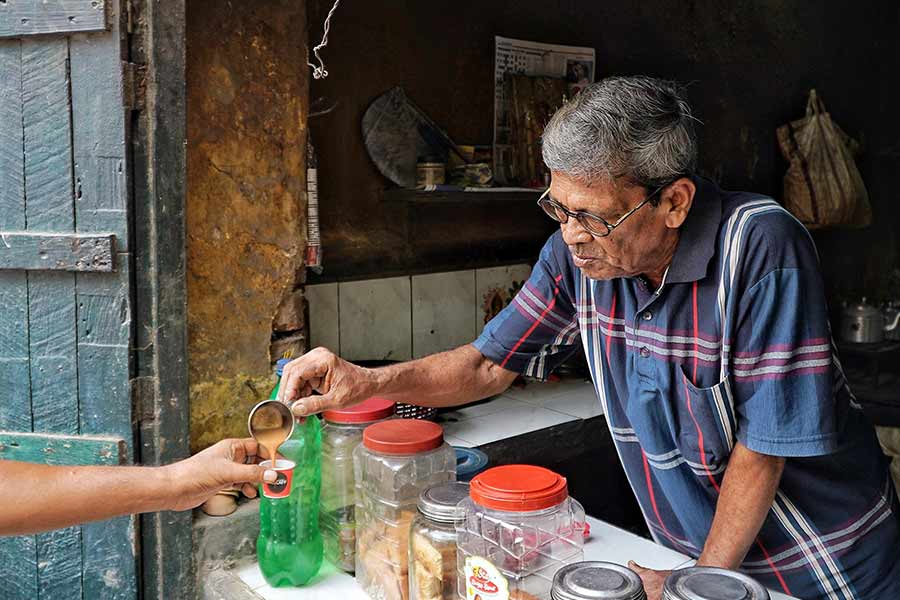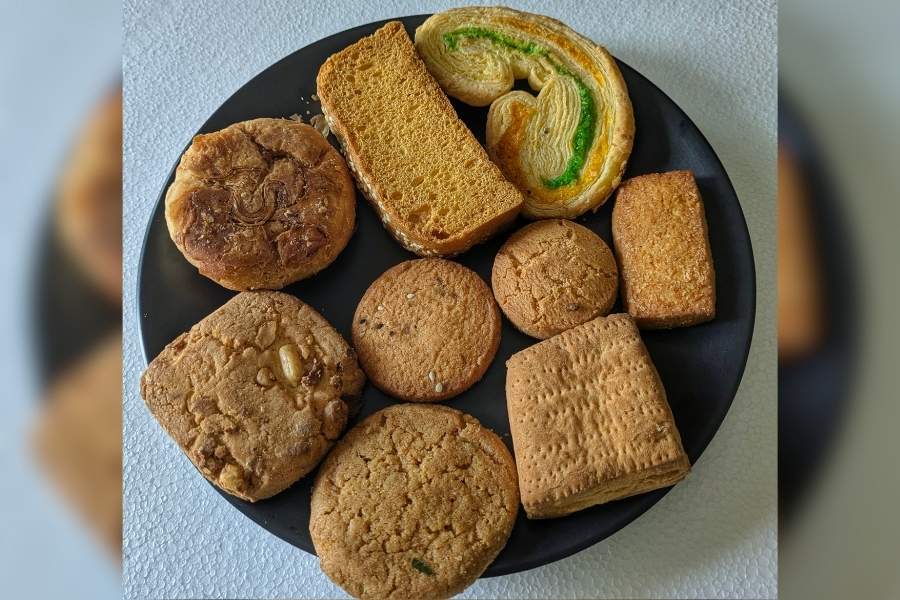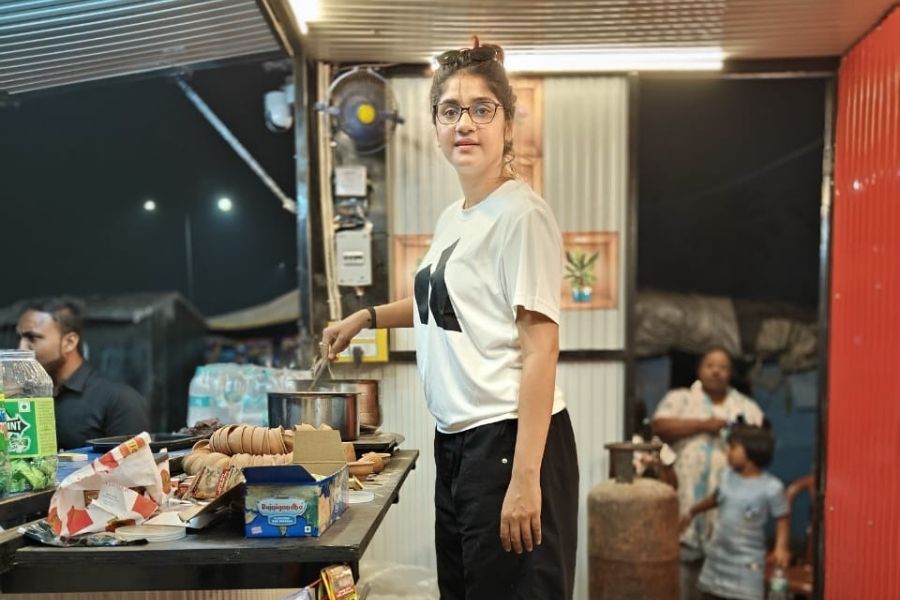“Dokan ta dekhish to ektu (Take care of the shop for a while please).”
The phrase hangs in the air at Naresh Shome's century-old tea stall in Serampore. Once his parting instruction whenever police arrived to arrest him for his political activities, the words had become the philosophical foundation of one the most remarkable social experiments in modern India.
It was just past three in the afternoon when we stepped into the dappled shade of the unassuming brick structure situated just opposite a burning ghat. The street buzzed with activity: cycle rickshaws wove past pedestrians, children in school uniforms streamed past, and the distant whistle of a train punctuated the cacophony of Bengali street life.
Yet, amidst this chaos, the tea shop exuded an almost meditative calmness.
The first surprise for any newcomer? There was no one behind the counter. No proprietor watched over the earthen cups stacked in neat pyramids. No cashier guarded the small metal collection box placed discreetly in one corner. Instead, customers moved with practiced ease, serving themselves and leaving payment without prompting or supervision.
“First time here?” asked Ashish Banerjee, a bespectacled man in his sixties, who had noticed hesitation in the faces of the new arrivals. Without waiting for an answer, he demonstrated the process — lifting the blackened kettle from its perch on the clay chulha (stove), pouring steaming tea into a bhanr (earthen cup), adding a precise measure of sugar, and stirring with a practiced flick of the wrist.
“Five Rupees,” he said, dropping coins into the collection box with a metallic clink. “Same price for 15 years.”
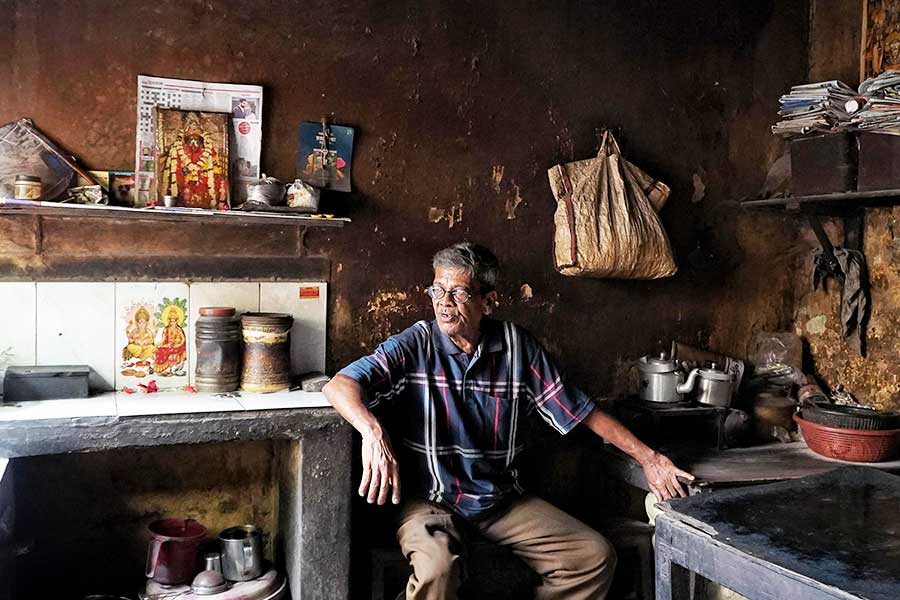
Ashish Banerjee minds the shop
Following his example revealed the distinctive taste — stronger than the milky chai sold by most vendors, and with a slightly smoky undertone imparted by the coal fire. It was served scalding hot, the earthen cup warming the palms in the cool afternoon breeze coming from the nearby Hooghly River.
"You’ve chosen a good day to visit," said Ajoy, introducing himself as a retired schoolteacher and daily visitor since 1975. "Wednesdays and Saturdays, we get the best adda.”
He gestured to the gathering crowd of afternoon regulars settling onto benches and stools that lined the periphery of the small space. Adda seemed as essential to this establishment as the tea itself.
True to his word, within minutes, visitors were drawn into animated discussions that went effortlessly from local politics to cricket scores, from rising vegetable prices to the declining quality of local fish.
"Tell them about Naresh Shome," someone suggested, followed by a moment of silence. A faded photograph on the wall showed a stern-faced man with intense eyes and a carefully trimmed moustache, the only ‘decoration’ in the otherwise austere space.
"He was a freedom fighter first," explained Ashish, "participating in the Swadeshi movement against British rule. Later, he became a Communist Party of India (Marxist) leader, fighting for workers in the jute mills."
The shop, opened sometime around 1920, had become a hub for political organising during the tumultuous decades of Indian history.
Some unspoken duties
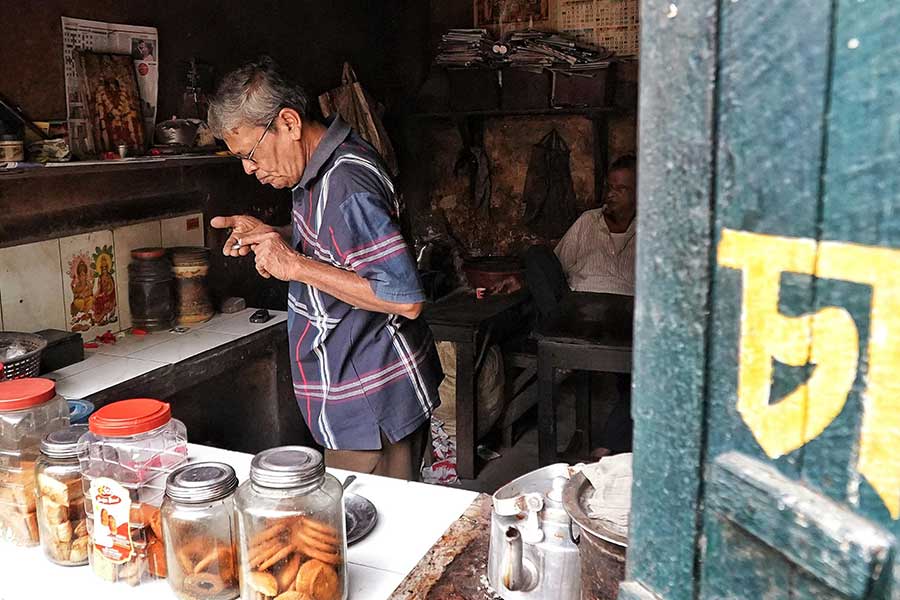
Tea still costs five rupees a cup here
As Ajoy spoke, something remarkable unfolded around the gathered visitors. Without discussion or any apparent coordination, two or three people began taking turns maintaining the shop.
An elderly man refilled the water kettle when it ran low. Another rearranged the cups when supplies dwindled. A middle-aged man in a panjabi swept fallen tea leaves from the counter. No one directed these activities; they simply happened as the needs arose.
"After Naresh-da’s frequent arrests, people got used to stepping in," explained Ajoy. "When he died in 2005 leaving no heirs, continuing this way seemed natural. “Amra Bangali – etai amader dhormo” (We are Bengali – this is our duty)."
As afternoon stretched toward evening, the shop’s clientele changed. Office workers stopped by on their way home. A group of students from the college arrived, injecting youthful energy into conversations. The class divisions visible elsewhere in Indian society seemed remarkably absent here.
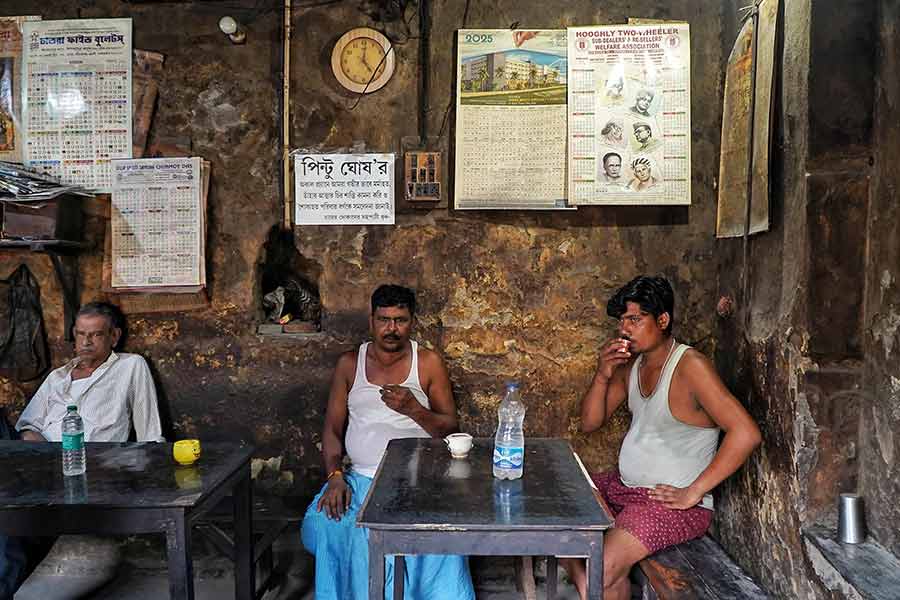
The class divisions visible elsewhere in Indian society seems remarkably absent here
"Bhai, ektu jaiga din” (Brother, please make some room),” called out a newcomer, and space was immediately created. Everyone was bhai or dada here, regardless of status or background.
When Probir, a cycle rickshaw puller, gulping down his tea before his evening shift, was asked why he thought the honour system worked, he seemed puzzled by the question.
"Lojja” (shame), he answered. The concept in Bengali culture goes deeper than its English translation, encompassing not just embarrassment but moral conscience and community standing.
"If I took without paying, how could I face these people tomorrow?" he asked. "Besides," he added with a philosophical air that seemed characteristically Bengali, "Jodi dish, tobe pabi" — “If you give, then you will get.”
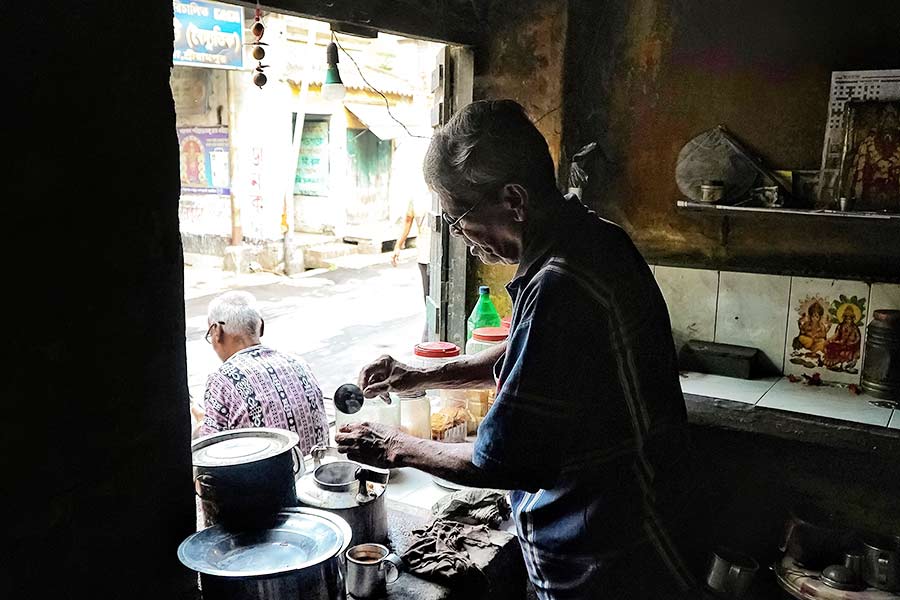
Money occasionally disappears. But it is treated as inevitable friction in a human system, not fatal flaws requiring structural overhaul
As questions continued, a pattern emerged in the responses. No one claimed the system was perfect. Money occasionally disappeared. But it was treated as inevitable friction in a human system, not fatal flaws requiring structural overhaul.
"Ektu beshi, ektu kom. Bhabna ki?" — “A little more, a little less – why worry?” said an elderly man, shrugging off concerns with the pragmatic fatalism that had helped Bengal weather countless historical storms.
"This is not just about tea," insisted Sushanto Roy, whose grandfather had first brought him here in the 1960s. "This is about proving something. In Naresh kaku's time, it was proving that another economic system was possible — one based on communal values rather than exploitation. Today, perhaps, it's proving that despite the smartphones, shopping malls, capitalism, something of our core Bengali identity remains intact.”
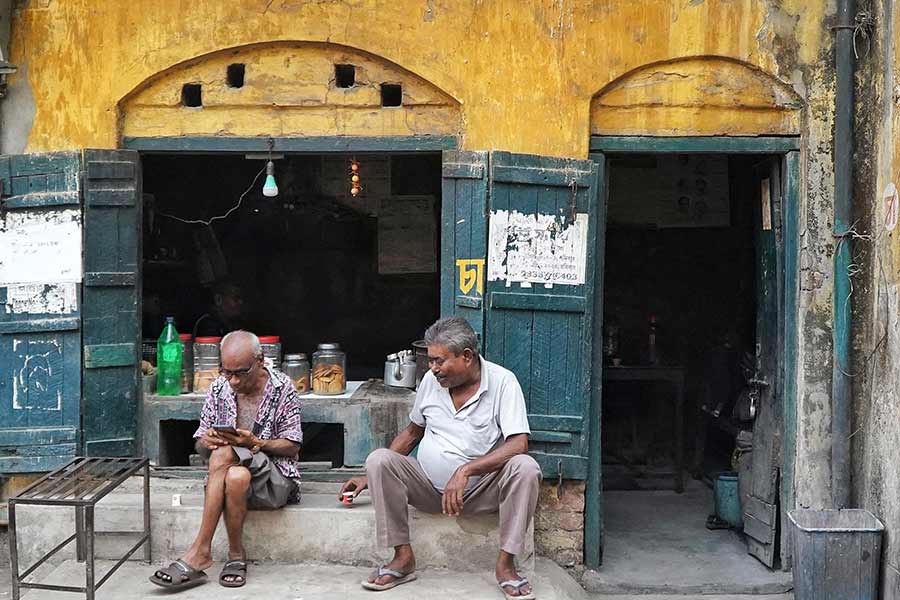
The tea shop thrives on collective trust and shared responsibility
As the evening wore on, the actual owner of the building, Ashok Chakraborty, returned from his office job. Each weekday morning, he opens the shop and then leaves for work, entrusting its operation to a group of dedicated volunteer-customers. Upon his return, he seamlessly rejoins the ongoing routine, blending into the familiar rhythm of the tea shop that thrives on collective trust and shared responsibility.
Who takes the profit?
“Community needs,” several voices answered in unison when asked about the extra money from the collection box. They explained how surplus funds supported neighbourhood Durga Puja celebrations, provided emergency relief during floods, or helped local families facing medical emergencies.
"That’s why this isn’t charity," emphasised Banerjee. "It’s community economics. Everyone contributes what they can, everyone benefits when needed. Naresh-da was teaching economics long before I ever lectured on it at the college.”
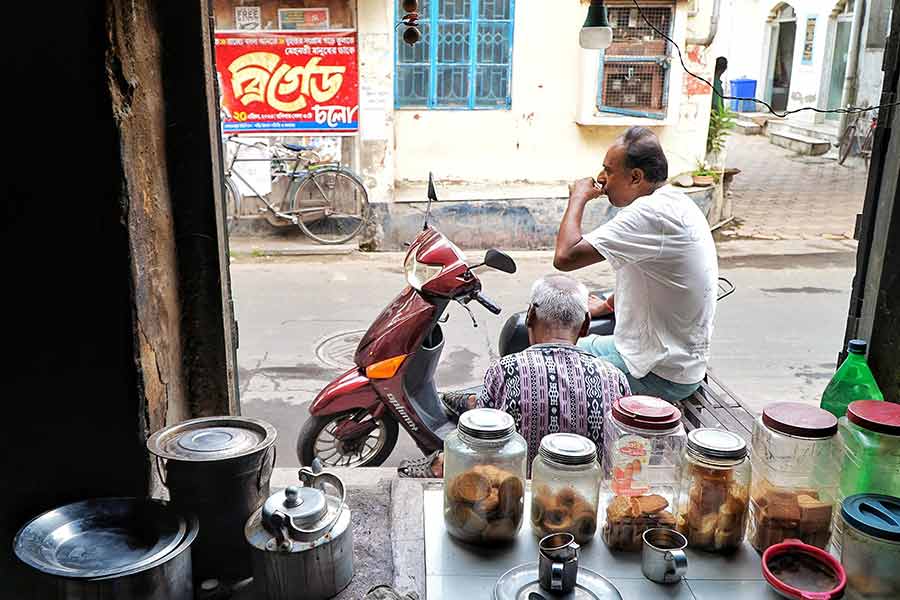
The cycle has continued unbroken for decades, sustained not by economic incentives or external enforcement but by something more fundamental — the shared belief that some institutions transcend ordinary commercial logic.
Through Serampore’s darkening streets, past the imposing colonial architecture of this Danish-founded town, those five simple words continued to echo: “Dokan ta dekhish to ektu”.
What began as a practical request has evolved into something approaching a philosophy of life, a quiet rebuttal to dominant economic narratives.
In this small corner of Bengal, at least, people decided that trust was still a viable foundation for commerce, that community could still triumph over self-interest, and that a simple cup of tea could still represent something profound about human possibility.
In an India of QR codes and credit scores, Naresh Shome’s tea stall still runs on something less tangible: honour.
